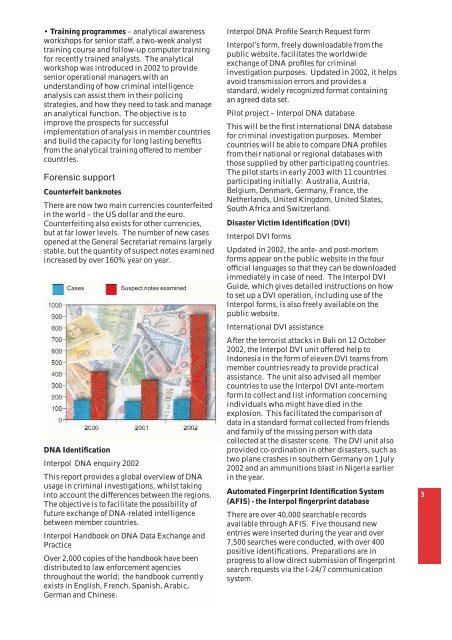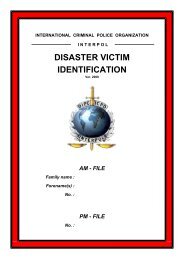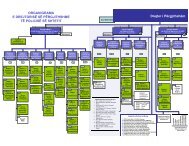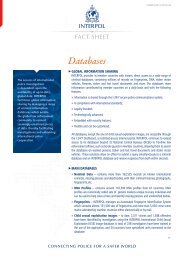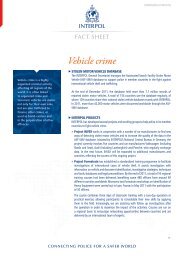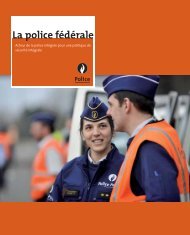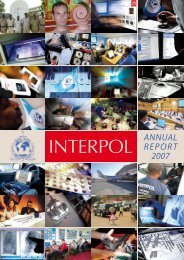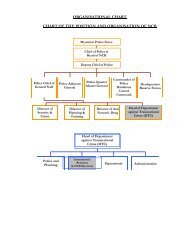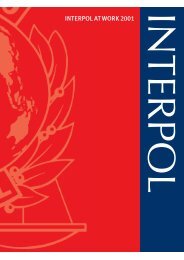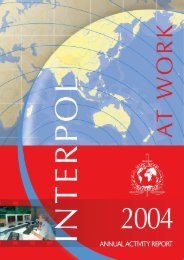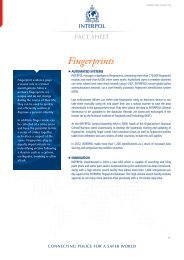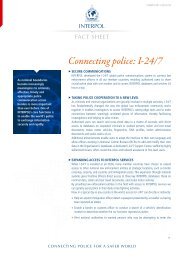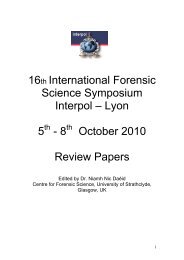Download - Interpol
Download - Interpol
Download - Interpol
Create successful ePaper yourself
Turn your PDF publications into a flip-book with our unique Google optimized e-Paper software.
• Training programmes – analytical awareness<br />
workshops for senior staff, a two-week analyst<br />
training course and follow-up computer training<br />
for recently trained analysts. The analytical<br />
workshop was introduced in 2002 to provide<br />
senior operational managers with an<br />
understanding of how criminal intelligence<br />
analysis can assist them in their policing<br />
strategies, and how they need to task and manage<br />
an analytical function. The objective is to<br />
improve the prospects for successful<br />
implementation of analysis in member countries<br />
and build the capacity for long lasting benefits<br />
from the analytical training offered to member<br />
countries.<br />
Forensic support<br />
Counterfeit banknotes<br />
There are now two main currencies counterfeited<br />
in the world – the US dollar and the euro.<br />
Counterfeiting also exists for other currencies,<br />
but at far lower levels. The number of new cases<br />
opened at the General Secretariat remains largely<br />
stable, but the quantity of suspect notes examined<br />
increased by over 160% year on year.<br />
Cases<br />
Suspect notes examined<br />
DNA Identification<br />
<strong>Interpol</strong> DNA enquiry 2002<br />
This report provides a global overview of DNA<br />
usage in criminal investigations, whilst taking<br />
into account the differences between the regions.<br />
The objective is to facilitate the possibility of<br />
future exchange of DNA-related intelligence<br />
between member countries.<br />
<strong>Interpol</strong> Handbook on DNA Data Exchange and<br />
Practice<br />
Over 2,000 copies of the handbook have been<br />
distributed to law enforcement agencies<br />
throughout the world; the handbook currently<br />
exists in English, French, Spanish, Arabic,<br />
German and Chinese.<br />
<strong>Interpol</strong> DNA Profile Search Request form<br />
<strong>Interpol</strong>’s form, freely downloadable from the<br />
public website, facilitates the worldwide<br />
exchange of DNA profiles for criminal<br />
investigation purposes. Updated in 2002, it helps<br />
avoid transmission errors and provides a<br />
standard, widely recognized format containing<br />
an agreed data set.<br />
Pilot project – <strong>Interpol</strong> DNA database<br />
This will be the first international DNA database<br />
for criminal investigation purposes. Member<br />
countries will be able to compare DNA profiles<br />
from their national or regional databases with<br />
those supplied by other participating countries.<br />
The pilot starts in early 2003 with 11 countries<br />
participating initially: Australia, Austria,<br />
Belgium, Denmark, Germany, France, the<br />
Netherlands, United Kingdom, United States,<br />
South Africa and Switzerland.<br />
Disaster Victim Identification (DVI)<br />
<strong>Interpol</strong> DVI forms<br />
Updated in 2002, the ante- and post-mortem<br />
forms appear on the public website in the four<br />
official languages so that they can be downloaded<br />
immediately in case of need. The <strong>Interpol</strong> DVI<br />
Guide, which gives detailed instructions on how<br />
to set up a DVI operation, including use of the<br />
<strong>Interpol</strong> forms, is also freely available on the<br />
public website.<br />
International DVI assistance<br />
After the terrorist attacks in Bali on 12 October<br />
2002, the <strong>Interpol</strong> DVI unit offered help to<br />
Indonesia in the form of eleven DVI teams from<br />
member countries ready to provide practical<br />
assistance. The unit also advised all member<br />
countries to use the <strong>Interpol</strong> DVI ante-mortem<br />
form to collect and list information concerning<br />
individuals who might have died in the<br />
explosion. This facilitated the comparison of<br />
data in a standard format collected from friends<br />
and family of the missing person with data<br />
collected at the disaster scene. The DVI unit also<br />
provided co-ordination in other disasters, such as<br />
two plane crashes in southern Germany on 1 July<br />
2002 and an ammunitions blast in Nigeria earlier<br />
in the year.<br />
Automated Fingerprint Identification System<br />
(AFIS) - the <strong>Interpol</strong> fingerprint database<br />
There are over 40,000 searchable records<br />
available through AFIS. Five thousand new<br />
entries were inserted during the year and over<br />
7,500 searches were conducted, with over 400<br />
positive identifications. Preparations are in<br />
progress to allow direct submission of fingerprint<br />
search requests via the I-24/7 communication<br />
system.<br />
3


